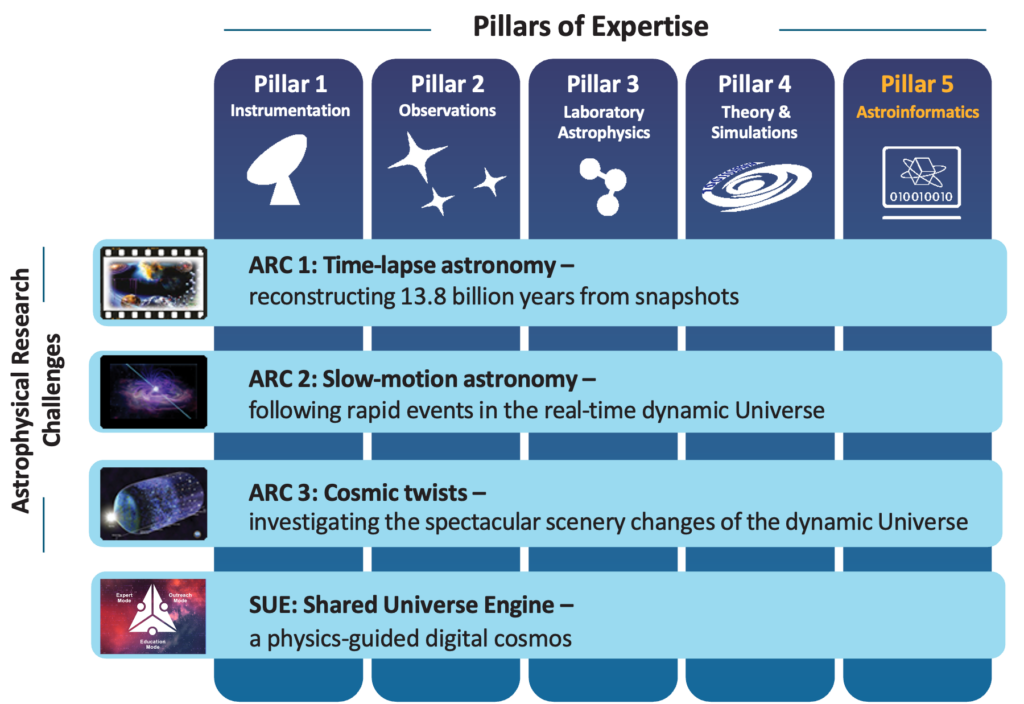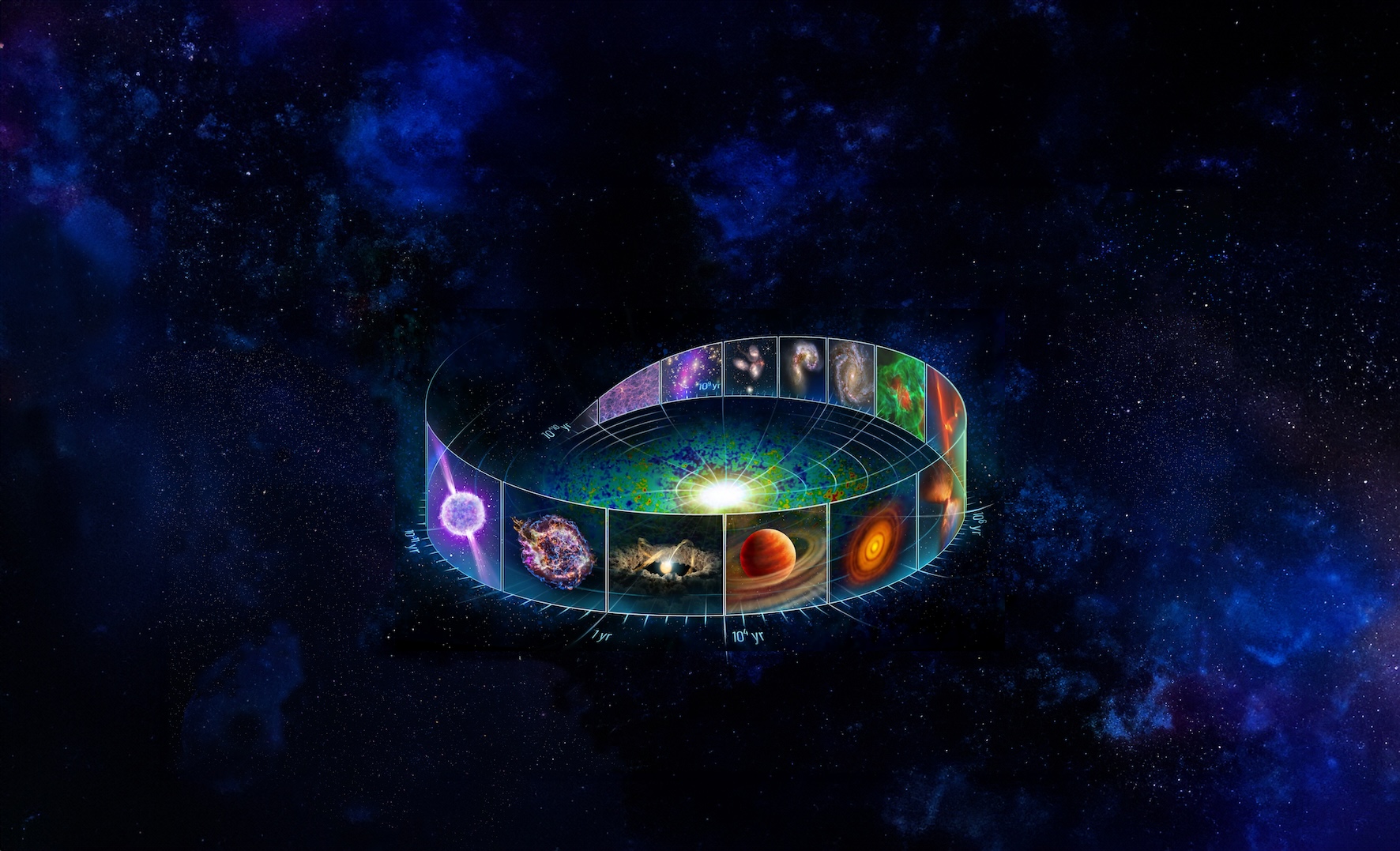The dynamic evolution of our Universe is regulated by nonlinear physical processes that occur on vastly different timescales, from fractions of a second to billions of years. How are they interconnected to shape the Universe? The proposed Cluster of Excellence “Our Dynamic Universe” (Dynaverse) will deliver a breakthrough in our physical understanding by addressing three core Astrophysical Research Challenges (ARCs).
ARC1: Time-Lapse Astronomy
One of the grand problems in Astrophysics is to reconstruct gradual, epoch-spanning processes like galaxy evolution from observational snapshots into an explanatory “movie of the Universe”.
ARC2: Slow-Motion Astronomy
We determine how rapid, transient key events like supernova explosions shape these long-term processes.
ARC3: Cosmic Twists
We elucidate the pivotal turning points that gave structures and light to the expanding, nascent Universe.
The SUE: The Shared Universe Engine
Dynaverse will pioneer new technologies to explore, quantify, and systematically develop the connections between physical processes acting on all time scales.

The Bonn-Cologne area is a world-class hub for astrophysics. It builds on a holistic approach with four complementary Pillars of expertise. P1: developing state-of-the-art detectors and instruments for international telescopes; P2: leading numerous large-scale observational programmes based on open and guaranteed observing time; P3: operating top-tier laboratories for astrophysics; and P4: simulating the evolution of planets, stars, and galaxies on high-performance computers. State-of-the-art facilities, to many of which our team has prime access as a major partner, offer groundbreaking opportunities. These include upcoming radio telescopes delivering up to zettabytes of data per year, complementary multi-wavelength facilities, and the first European Exascale computer at FZJ.
Optimally exploiting the novel opportunities in the transformative era of Big-Data-Astrophysics promises breakthroughs. To succeed, overcoming the extreme challenges of the unprecedented big and heterogeneous data is crucial. In this new era, the astrophysical community needs innovative methods for discoveries. Dynaverse addresses this by combining experts in astrophysics, computer science, and mathematics to establish a fifth Pillar P5: Astroinformatics. Through P5 we will leverage AI and machine learning to develop new methods for astrophysics. All our data and insights will be publicly accessible in the Shared Universe Engine (SUE), a smart, open-source workflow and processing hub. The SUE will be a machinery of discovery and a collaborative workspace for the Dynaverse team and the community.
Technological innovations are key to address the ARCs and to build the SUE. New instruments, which improve sensitivity and resolution, open up previously inaccessible windows to the Universe. They enable novel observations, providing the opportunity to make exciting new discoveries. The interpretation of the observations relies on refined and new laboratory measurements, and on state-of-the-art simulations to link the Universe’s evolution over vastly different timescales. The various research aspects rely on specialised expertise within the individual subfields. To comprehensively study the chemical and dynamical evolution, the connection of this complementary expertise is necessary. Astrophysics in the Cologne-Bonn-J ̈ulich region is known to follow such a holistic approach. Currently, it is based on four Pillars of expertise: instrumentation (P1), observations (P2), laboratory astrophysics (P3), and theory & simulations (P4).
Right now, we are entering the new era of Big-Data-Astrophysics. We will address novel research aspects by establishing a fifth Pillar of expertise, Astroinformatics (P5). It is implemented in Dynaverse to perform research in the field of ML / AI-methods tailored to astronomy, to extract knowledge from heterogeneous data, decode dynamical and chemical processes, and compare simulations with observations and experimental data.

Training the next generation of researchers and students in these new technologies and methods is an essential part of Dynaverse to harvest the full scientific potential. The training of teachers and pupils is a fundamental concern. Thus, the SUE will be designed as a versatile platform including education, training, and public outreach modes.
Training Young Scientists
PhD-students will benefit from the graduate schools IMPRS, HDS-LEE and BCGS in Bonn and Cologne which have a strong heritage in bridging research activities and training of young scientists. BCGS has been established through the German Excellence Initiative, IMPRS forms a highly successful educational network between UoC, UB, and MPIfR. UoC, UB, FZJ, and DLR participate in the Helmholtz School for Data Science in Life, Earth and Energy, which provides an excellent setup for interdisciplinary PhD-level research in data-driven sciences.
![]()




